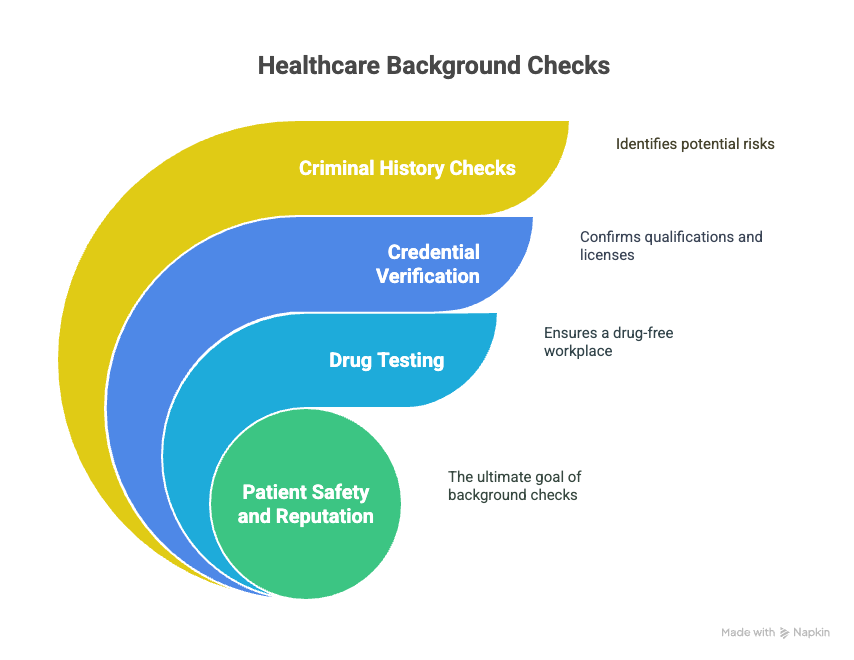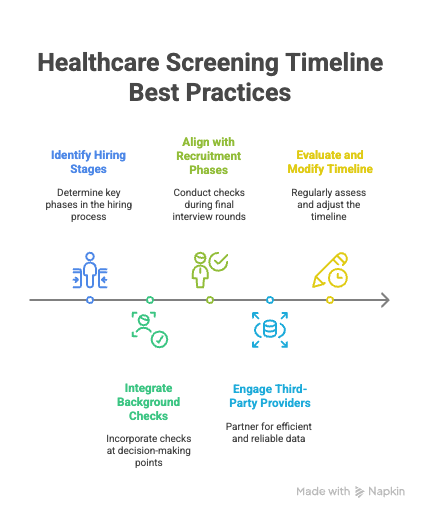In the high-stakes world of healthcare, hiring the right professionals is crucial. Background checks are an essential part of the hiring process, ensuring that candidates possess the integrity and qualifications necessary for the healthcare environment. But when is the best time to conduct these checks? This comprehensive guide explores the optimal timing for healthcare background checks, balancing efficiency and compliance to help organizations make informed decisions.
Key Takeaways
- Conducting background checks at the right stage of healthcare hiring protects patient safety and organizational integrity.
- Healthcare background checks typically include criminal history, credential verification, and drug testing.
- Timing checks pre-hire can flag issues early but may be more resource-intensive compared to post-offer checks, which focus on final candidates.
- The timing of checks depends on job role sensitivity, legal mandates, and industry practices.
- Using third-party vendors and aligning background checks with hiring phases can enhance efficiency and compliance.
Introduction
In healthcare, hiring the right professionals is critical. Every decision impacts patient safety and organizational trust. Background checks are more than routine; they are key to ensuring professionals possess the integrity and qualifications needed. This guide focuses on the timing of these checks. We'll explore when in the hiring process it's best to conduct them, aiming to balance efficiency with compliance. The goal is to pinpoint the most effective stage for running these checks, helping you make informed hiring decisions that uphold the healthcare sector's standards.
EXPERT INSIGHT: Healthcare background screening? It's more than a procedure within medicine; it's a sacred commitment to protect each patient, every team, and every act of trust within our care. Before my own eyes, I see how timely, selective screening—anything but a legal formality—can make the difference between danger and safety. Our hiring extends beyond job applications; we have a heavy responsibility to save lives. This sacred responsibility needs more than technical compliance; it requires compassion, vigilance, and good sense. In healthcare, those who gain access make a difference to everyone they come into contact with. - Charm Paz, CHRP
Understanding Background Checks in Healthcare
Healthcare background checks are designed to ensure that candidates meet the necessary standards for working in the healthcare sector. These checks typically consist of three main components: criminal history, credential verification, and drug testing. Criminal history checks look for any records that may raise concerns about a candidate's ability to safely and ethically perform their job duties. Credential verification confirms that a candidate has the qualifications and licenses required for their role. Drug testing helps maintain a drug-free workplace, which is crucial for patient safety and effective healthcare delivery.
Background checks are essential for safeguarding patient safety and protecting the reputation of healthcare organizations. For example, hiring someone with undisclosed criminal behavior could endanger patients and lead to legal repercussions. Ensuring that all staff credentials are verified is critical for compliance and maintaining trust. In healthcare, where human lives are at stake, thorough vetting cannot be overstated.

Regulations for healthcare background checks are guided by legal bodies like the Equal Employment Opportunity Commission (EEOC), which ensure fair and unbiased hiring practices. These regulations help prevent discrimination and protect candidates' rights while ensuring that employers can access the information necessary to make informed hiring decisions. Understanding these legal mandates is key to implementing an effective and compliant background check process.
Timing Healthcare Background Checks
Pre-Hire vs. Post-Offer Screening
Conducting background checks at the right stage in the hiring process is a balancing act. Let's break down the two primary approaches: pre-hire screening and post-offer screening.
Pre-Hire Screening
When you conduct background checks early in the process, you catch critical red flags before investing too much in a candidate. This minimizes risks and saves time and resources for both you and your organization. You can avoid the complications of making a job offer only to retract it down the road. Consider, though, the costs of screening multiple candidates—this can become resource-intensive. You might need to weigh the benefits of catching issues early against the expense of screening more people than necessary.
Post-Offer Screening
Screening after making an offer is less resource-demanding. At this point, you've narrowed down the pool to likely hires, so you're only investing in checks for final candidates. But there’s a catch: finding a deal-breaking issue now could lead to onboarding delays. You might find yourself scrabbling to fill the position if a candidate doesn't pass muster post-offer.
Factors Influencing Timing
Job Role Sensitivity
Some positions need more scrutiny than others. For roles involving direct patient care, early background checks might be non-negotiable. Yet for administrative roles, where the immediate risks might be lower, post-offer screening could suffice. The stakes vary based on proximity to patients and access to sensitive information.
State and Federal Mandates
Legal requirements can dictate your timing. Different states have different rules on when background checks can be conducted. Compliance with these laws isn't just advisable—it's necessary.
By scrutinizing these factors, you position your organization to make smart decisions on when to conduct background checks, balancing thoroughness with efficiency.
Healthcare Screening Timeline: Best Practices
Creating an effective screening timeline requires clear structuring. Start by identifying the stages of your hiring process. Integrate background checks at transitional points where decision-making naturally occurs. This ensures they don't slow down your process unnecessarily or stage them too early without justified purpose.
Align background checks with recruitment phases. Conduct checks once a candidate reaches final interview rounds, assuming they've shown promise and mutual interest is clear. This minimizes wasted resources while ensuring thorough vetting before hiring commitments.
Engage third-party providers to streamline operations. They specialize in obtaining reliable data promptly, offering scalability for varying hiring volumes. Selecting the right partner means finding a balance between speed, accuracy, and cost-effectiveness. Tap into your internal database of frequent queries to ensure thorough understanding before collaborating closely with these experts.

By embedding background checks within these phases, you create a system driven by logic and necessity rather than tradition or assumption. Evaluate your timeline regularly and remain open to modifications that respond to shifts in regulation or organizational needs. This proactive stance keeps your hiring practice agile and robust.
Compliance Considerations
Healthcare organizations must ensure compliance throughout the background check process, which involves strict adherence to various regulations at both the state and federal levels. Compliance is not just a legal requirement; it's a keystone for maintaining trust and credibility within the healthcare community.
Healthcare Onboarding Compliance
When onboarding new healthcare professionals, compliance with background check regulations is crucial. You need to focus on meticulous documentation to meet reporting obligations. Having clear records of checks conducted, results obtained, and actions taken is vital. This documentation serves as proof of due diligence should any questions or issues arise later. Streamlining this process with a centralized system helps manage these records efficiently.
Handling Sensitive Information
The background check process involves handling sensitive candidate information, including personal identification and criminal records. Secure management of this data is essential to protect privacy and remain compliant with regulations like the Health Insurance Portability and Accountability Act (HIPAA). Best practices include encrypting data, limiting access to authorized personnel, and regularly auditing procedures to ensure robust security measures.
How prepared is your organization to handle potential data breaches? Regular training for staff on data protection protocols can mitigate risks. Ensuring that every team member understands their role in maintaining confidentiality is key to safeguarding information and maintaining compliance.
By embedding compliance into every step of your background check process, you not only protect your organization from legal pitfalls but also build a foundation of trust that supports your reputation and operations in the healthcare sector.
Challenges and Solutions
Conducting timely background checks in healthcare often presents hurdles. One common issue is the delay in obtaining comprehensive and accurate information. Delays can occur with criminal record checks or verification of credentials, especially when dealing with out-of-state or international records. This lag can postpone hiring decisions, impacting staffing levels and patient care.
To counteract these delays, consider using specialized third-party vendors experienced in healthcare checks. They often provide faster turnaround times due to established processes and access to comprehensive databases. Tracking the average time for each component of the background check can also help identify bottlenecks.
Another challenge is ensuring compliance with varying state and federal regulations. Different states have distinct requirements, which can complicate the timing of background checks. Organizations must stay informed about these regulations, which influence not only when checks should be initiated but also what they should involve.
One solution is to develop a compliance calendar that maps out key regulatory timelines and deadlines. Regular training sessions for HR staff on compliance changes can keep the team updated and reduce mistakes that lead to re-verification or legal issues.
Lastly, balancing cost with thoroughness is crucial. It's tempting to cut corners to save money, especially in high-volume hiring periods. However, skimping on checks might lead to hiring unsuitable candidates, increasing turnover and potential liability.
Allocating a specific budget for background checks and involving financial officers in planning can help manage costs effectively. Clear communication between the hiring team and financial department ensures the background check process remains both thorough and fiscally responsible.
Addressing these challenges with strategic solutions not only expedites the hiring process but also strengthens compliance and reduces long-term costs.
Conclusion
Selecting the right moment to conduct background checks is central to effective hiring in healthcare. Timing can dramatically influence both hiring efficiency and compliance. Pre-hire checks might seem wasteful due to potential resource drain on unsuitable candidates, but they offer early risk detection. Meanwhile, post-offer checks simplify the process by focusing on final candidates, though they can delay onboarding if red flags arise.
Given the nuances of each role, timing often hinges on job sensitivity, state and federal mandates, and industry norms. A direct care role might demand earlier checks than administrative positions due to greater patient interaction. Regulatory landscapes also play a crucial part, as compliance with laws and guidelines from authoritative bodies remains non-negotiable.
To develop a robust background screening timeline, align checks with hiring phases. This ensures they evolve alongside recruitment needs. Collaboration with third-party providers can smooth out the process, freeing up internal resources and expertise.
Your practice should continually adapt to changes in industry standards. Regularly assess your hiring strategies to maintain compliance and effectiveness, improving your organization's safety and trust. A strategic approach to timing means you're not only finding the right fit but doing so in a legally sound and efficient manner.
Frequently Asked Questions (FAQs)
When should a background check be conducted for a healthcare job?
Background checks for healthcare jobs should be conducted after a conditional job offer is made. This ensures that only candidates seriously considered for the position undergo the process.
Is it legal to run a background check before making a job offer in healthcare?
Yes, it's legal, but many healthcare employers prefer to run background checks after making a conditional offer to avoid potential allegations of discrimination.
What happens if a candidate fails a healthcare background check?
If a candidate fails a background check, the healthcare employer may withdraw the job offer. The candidate should be informed of the reason and given an opportunity to respond or dispute the findings.
Do hospitals run background checks before or after hiring?
Most hospitals conduct background checks after extending a conditional job offer. This allows the hiring process to remain fair and efficient.
What is a conditional offer in healthcare hiring?
A conditional offer is a job offer that depends on certain requirements being met, such as passing a background check or drug test. If the candidate fulfills these conditions, the offer becomes final.
What types of information are typically checked in a healthcare background check?
Healthcare background checks usually include criminal records, employment history, education verification, professional licenses, and sometimes credit history.
Can a previous misdemeanor affect your chances of getting a healthcare job?
A misdemeanor might affect your chances, depending on its nature and relevance to the position. Employers typically assess the specific circumstances.
Are drug tests part of the healthcare background check process?
Yes, drug tests are commonly included in the background check process for healthcare positions to ensure a safe and trustworthy workplace.
How long do healthcare background checks usually take?
Healthcare background checks typically take one to two weeks to complete, though this can vary based on the complexity of the check and the responsiveness of the agencies involved.

GCheck Editorial Team
Meet the GCheck Editorial Team, your trusted source for insightful and up-to-date information in the world of employment background checks. Committed to delivering the latest trends, best practices, and industry insights, our team is dedicated to keeping you informed.
With a passion for ensuring accuracy, compliance, and efficiency in background screening, we are your go-to experts in the field. Stay tuned for our comprehensive articles, guides, and analysis, designed to empower businesses and individuals with the knowledge they need to make informed decisions.
At GCheck, we're here to guide you through the complexities of background checks, every step of the way.






